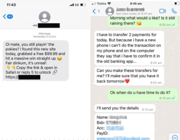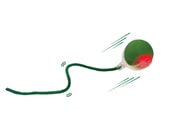Protect your private information and money from sneaky anti-virus scammers - here's what you need to know
By
- Replies 10
Online scams are a real danger, and we here at the Seniors Discount Club know it all too well. Phishing emails, fake online stores – you name it, we’ve seen it. But one of the most challenging things to deal with while navigating the web is spotting the scams that are targeted specifically at you.
We’ve received several reports from our members that they have received emails from what seemed to be the anti-virus company ‘Norton’. However, it was later discovered that they were part of a scammer’s plot. Shocking, isn’t it?
Member Cherie James shared: 'I just wanted to let you know that there are some other scammers about. We got an email looking to be from NORTON with an attachment of an invoice, saying thanks for an amount of $499.99 of an annual subscription that will be taken out of our account.'
She also revealed that she received a similar email purportedly from the McAfee anti-virus company.

Meanwhile, another member notified the SDC of an email from an account posing as a Norton representative and informing her of the necessity to 'update her profile' through a suspicious link if she wanted her account to be 'more secure', adding that she found the entire ordeal laughable.
Member Margit Levay wrote: 'I received an email today from Norton LifeLock Australia Pty Ltd (which seems to be quite real) saying that if I keep my profile up to date, they can do a more extensive job monitoring for suspicious activities and threats against me.'
'I found it laughable that they want me to update my profile with. Needless to say, I did not respond, did not update and now deleted the email.'
As if that was not bad enough, the scammer's emails also featured a contact number that had been designed to look official but was actually traced back to Hawaii.
Norton was quick to take action, issuing a public statement in which they warned their users about this scam.
According to the anti-virus, the scheme behind this is as follows: once a garbled invoice is received, the scammer phones the target and informs them that they will be penalised within 24 hours if they fail to call the number connected to the invoice or email them back.

Usually, the scammers leave a number that is unusable on purpose to make the situation more stressful for the victim. If the number still works (which is highly unlikely given that scammers usually have trouble keeping their operations running), the target calls back and can prevent the transaction by providing information of various kinds.
Norton has also confirmed that if you receive an unexpected email, and you don't subscribe to an anti-virus service (or Norton specifically), you should discard it right away.
You should also notify the company through its official customer service assistance form if you receive an email from Norton that you weren't expecting.

Scammers impersonating anti-virus companies is one of the more sophisticated online scams out there. By posing as representatives of well-known companies like Norton or McAfee, they are able to gain the trust of their victims and convince them to provide sensitive personal information.
If you receive an unsolicited email or text message from a supposed anti-virus company, you should disregard it immediately.
Stay safe, folks! Know anything else about this scam? Share it with us in the comments!
We’ve received several reports from our members that they have received emails from what seemed to be the anti-virus company ‘Norton’. However, it was later discovered that they were part of a scammer’s plot. Shocking, isn’t it?
Member Cherie James shared: 'I just wanted to let you know that there are some other scammers about. We got an email looking to be from NORTON with an attachment of an invoice, saying thanks for an amount of $499.99 of an annual subscription that will be taken out of our account.'
She also revealed that she received a similar email purportedly from the McAfee anti-virus company.

SDC members report the suspicious emails they received from accounts that posed as the anti-virus company Norton. Credit: Pexels/Anna Tarazevich.
Meanwhile, another member notified the SDC of an email from an account posing as a Norton representative and informing her of the necessity to 'update her profile' through a suspicious link if she wanted her account to be 'more secure', adding that she found the entire ordeal laughable.
Member Margit Levay wrote: 'I received an email today from Norton LifeLock Australia Pty Ltd (which seems to be quite real) saying that if I keep my profile up to date, they can do a more extensive job monitoring for suspicious activities and threats against me.'
'I found it laughable that they want me to update my profile with. Needless to say, I did not respond, did not update and now deleted the email.'
As if that was not bad enough, the scammer's emails also featured a contact number that had been designed to look official but was actually traced back to Hawaii.
Norton was quick to take action, issuing a public statement in which they warned their users about this scam.
According to the anti-virus, the scheme behind this is as follows: once a garbled invoice is received, the scammer phones the target and informs them that they will be penalised within 24 hours if they fail to call the number connected to the invoice or email them back.

Norton informed their customers about the scam, warning them not to click any suspicious links from the emails. Credit: Norton.
Usually, the scammers leave a number that is unusable on purpose to make the situation more stressful for the victim. If the number still works (which is highly unlikely given that scammers usually have trouble keeping their operations running), the target calls back and can prevent the transaction by providing information of various kinds.
Norton has also confirmed that if you receive an unexpected email, and you don't subscribe to an anti-virus service (or Norton specifically), you should discard it right away.
You should also notify the company through its official customer service assistance form if you receive an email from Norton that you weren't expecting.
Key Takeaways
- Be aware of the latest anti-virus scams targeting those who subscribe to official anti-virus companies.
- Be mindful of any emails received from anti-virus companies asking for any sort of personal information such as bank account numbers, driver's licence numbers, credit card numbers, and email addresses.
- If you believe the email may be a scam, contact the customer service hotline of the anti-virus company to confirm its authenticity.
- If you are unsure or don’t subscribe to an anti-virus service, simply delete the email.
Scammers impersonating anti-virus companies is one of the more sophisticated online scams out there. By posing as representatives of well-known companies like Norton or McAfee, they are able to gain the trust of their victims and convince them to provide sensitive personal information.
If you receive an unsolicited email or text message from a supposed anti-virus company, you should disregard it immediately.
Stay safe, folks! Know anything else about this scam? Share it with us in the comments!







